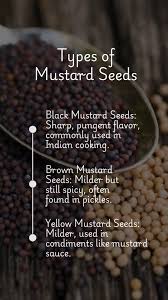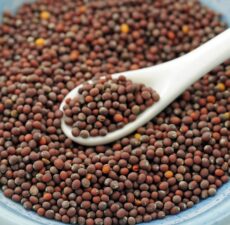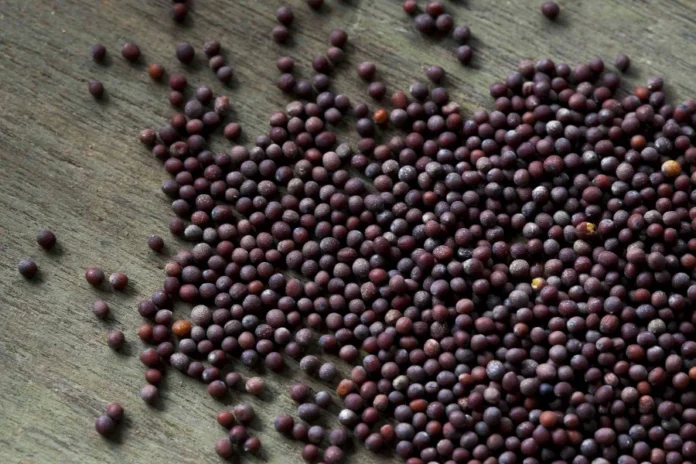What is Mustard?
Mustard is a plant known for its seeds, which are used to make mustard sauce and powder. There are different types, like black, brown, and yellow mustard, each with a unique taste. The seeds are used in cooking, while the leaves, called mustard greens, can be eaten in salads or cooked. Mustard is also good for health, as it contains antioxidants and may help reduce inflammation.
Types
There are three main types of mustard:

- Yellow Mustard (Sinapi’s alba):
Also known as white mustard, it has a mild flavor and is commonly used in yellow mustard sauces.
- Red Mustard (Brassica juncea):
Spicier than yellow mustard, brown mustard is used in Dijon mustard and many Indian dishes.
- Black Mustard (Brassica nigra):
The strongest and spiciest of the three, black mustard seeds are often used in traditional Indian and Middle Eastern cooking.
What are Red Mustard Seeds?

Red mustard seeds come from the red mustard plant (Brassica juncea), a type of mustard commonly used in cooking and traditional medicine. These seeds are known for their spicy, pungent flavor and are typically used in Asian and Indian cuisines. The seeds are rich in nutrients, including vitamins, minerals, and antioxidants, and are often used in pickling, seasoning, or grinding into mustard condiments. Red mustard seeds are also believed to have anti-inflammatory and digestive benefits.
Forms
Here are the common forms of red mustard seeds:
- Whole Seeds: Used for tempering and pickling, adds a nutty flavor when heated.
- Ground Powder: Used as a spice in rubs, marinades, and sauces.
- Mustard Paste: A condiment made from ground seeds, vinegar, and water.
- Oil: Extracted for cooking and massage, known for its warming effects.
- Capsules/Supplements: Taken for potential health benefits like digestion and inflammation relief.
Health Benefits
Red Mustard seeds provide a various amount of health benefits because of anti-inflammatory and antioxidant properties. Some of the most common health benefits are described below:
Good for Digestive Health
Mustard seeds are also excellent for your digestive system. If you are suffering from the problem of indigestion then mustard seeds can help to get rid of it. The seeds are packed with fiber, which helps in easy bowel movement and enhances the digestive power of the body.
Improves Digestion

Red mustard seeds are rich in dietary fiber, which helps regulate bowel movements and promotes a healthy digestive system. They also contain compounds that stimulate the production of digestive juices, aiding in better food breakdown and nutrient absorption. This can help prevent indigestion, bloating, and constipation.
Anti-inflammatory Effects
Mustard seeds contain selenium and magnesium, which have anti-inflammatory properties. These compounds help reduce chronic inflammation, which can contribute to conditions like arthritis, asthma, and cardiovascular diseases. The sulfur content in mustard seeds also supports these anti-inflammatory benefits.
Rich in Antioxidants
Red mustard seeds are a good source of antioxidants, including flavonoids, carotenoids, and vitamin E. These antioxidants help neutralize harmful free radicals in the body, reducing oxidative stress and lowering the risk of chronic diseases like cancer, heart disease, and premature aging.
Prevent Cancer
Mustard seeds are packed with compounds like glucosinolates and tyrosinase, which prevent the growth of cancer-causing cells in the body. As per a study published in the Journal Human & Experimental Toxicology, the tiny seeds may have chemo preventive potential and may protect against the effect of carcinogens.
Provide Relief from Headache

Mustard seeds are also effective when you are suffering from headaches and migraines. The seeds are packed with magnesium that soothes our nerve system and relieves the pain and strain in any different parts of our body.
Strengthen Bones, Teeth, and Gums
Mustard seeds are also good for your bones as they are packed with a mineral called selenium, which makes your bones stronger. They also help to strengthen your nails, hair, and teeth. Mustard seeds contain antioxidant and anti-inflammatory properties that help in relieving pain in the gum, bones, and teeth.
Good for Skin
It is important to keep your skin hydrated in every season and mustard seeds can help you with this. The seeds hydrate your skin, remove all the impurities and protect your skin from acne. The seeds are packed with anti-inflammatory properties that can reduce inflammation in the body.
Regulates Blood Sugar
Studies suggest that mustard seeds may help regulate blood sugar levels by improving insulin sensitivity. The fiber content in the seeds slows down the absorption of glucose in the bloodstream, helping to maintain stable blood sugar levels, which is beneficial for people with diabetes or those at risk of insulin resistance.
Side Effects

- Skin irritation
- Allergic reactions
- Gastrointestinal discomfort
- Low blood pressure (hypotension)
- Interference with thyroid function
- Risk of kidney issues (with excessive consumption)




